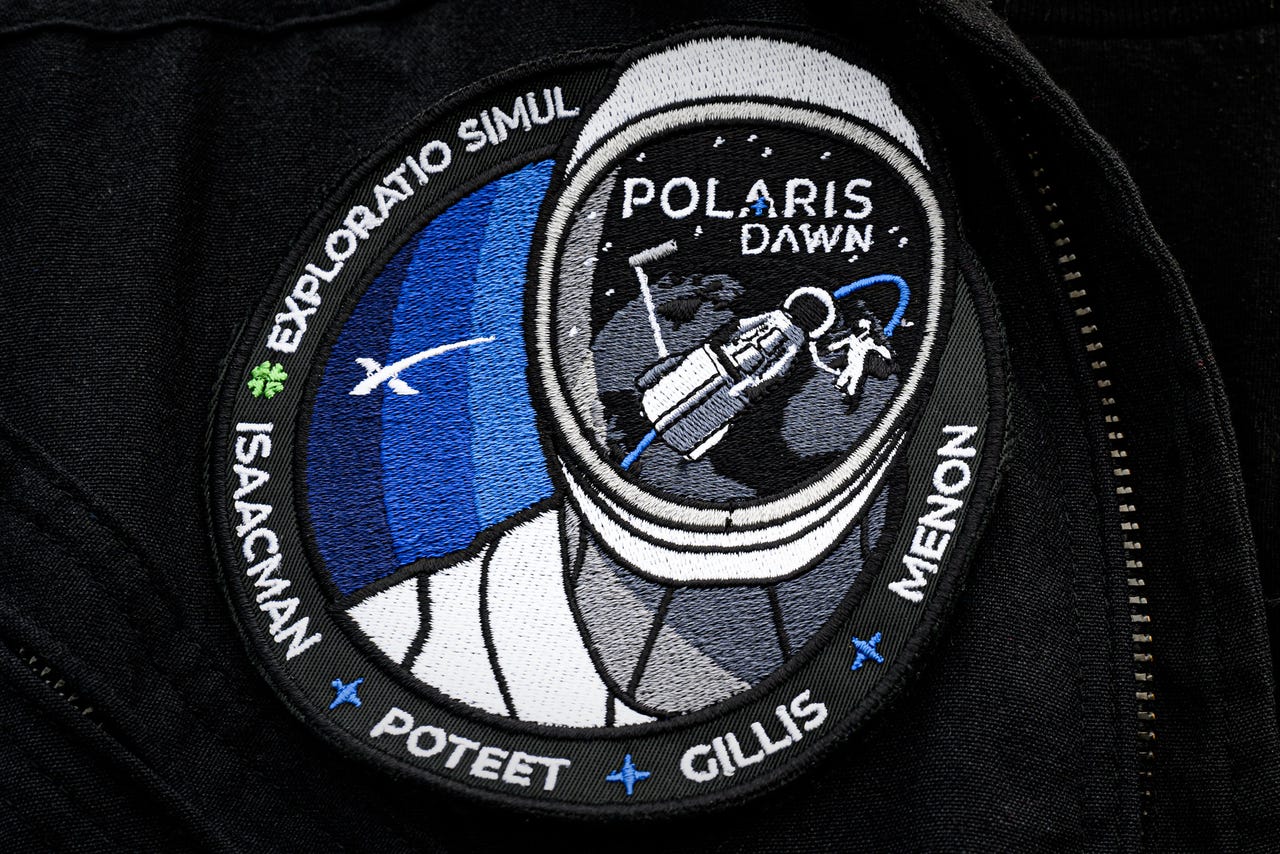
































The Polaris Dawn mission will launch no earlier than March 2023.
Image: Polaris Program/John KrausThe Polaris Dawn spaceflight, a SpaceX mission slated to launch as soon as March, will be a pioneering mission. Its crew will attempt the first-ever commercial spacewalk. They'll also be the first crew to test Starlink laser-based communications in space. If all goes according to plan, the mission will set a new record for the highest Earth orbit ever flown.
Also: Forget the Moon, NASA's next big mission is a lot closer to home
Perhaps just as significantly, Polaris Dawn aims to break new ground in studying human health, with the crew conducting dozens of science and research experiments to study the effects of spaceflight and space radiation on the human body.
However, among the four-person crew on the private space mission, there's just one member with specialized expertise in human biology and medical care: Anna Menon, SpaceX's lead space operations engineer, who worked for seven years at NASA as a biomedical flight controller for the International Space Station.
That lack of expertise left SpaceX with a unique challenge: how do you prepare a flight crew, with limited time available for training, to use medical tools and perform diagnostic tests on their own -- and to do it in space, without assistance, and in a place where the environment is obviously completely different from Earth's?
The answer, it turns out, is video games.
SpaceX has partnered with the seven-year-old company Level Ex to train the Polaris Dawn crew to perform medical ultrasound procedures. Level Ex uses sophisticated, real-time simulation technology to gamify medical training -- all on applications you can download on your phone.
Level Ex's mission -- founder and CEO Sam Glassenberg said to -- is "advancing the practice of medicine through play."
The company is "accelerating the adoption curve of new treatments and new devices using video game tech and video game design," he explained. "Space health is just a local extension of that."
Level Ex already has three million players using its games, including more than one million medical professionals, according to Glassenberg. Its portfolio of games are designed for specialists such as cardiologists and pulmonologists. In Gastro Ex, for example, doctors can practice performing GI procedures with different endoscopic tools inside of seemingly real -- but actually virtual -- anatomy. Airway Ex, meanwhile, lets doctors practice intubating virtual patients in realistic OR settings.
A screenshot of a Level Ex game, showing a virtual rendering of a patient opening his mouth.
Image: Level ExLevel Ex offers the only games, Glassenberg said, that you can play to earn Continuing Medical Education (CME) credit for renewing your medical license. The company also works with nearly three dozen of the best life-science device makers to accelerate the learning and adoption of their technologies.
Medical training simulations resonate with medical professionals because it's a huge step up from the alternative -- learning to perform new procedures or use new tools on live patients. That same logic clearly extends to training astronauts, who simply don't have the time for full medical training. Astronauts will train for years to join a week-long space mission. With so much to learn, "we don't have time to give everyone a medical degree in space health," Glassenberg said.
On top of that, practicing on Earth isn't going to replicate the conditions in space, anyway. "Your heart physically changes shape -- it becomes more spherical in microgravity -- and your blood flow changes direction," Glassenberg noted. "So how do we know that what you're looking at is normal?"
In 2019, Level Ex received a grant from the Translational Research Institute for Space Health (TRISH) to create the most realistic real-time ultrasound simulation ever, to provide what's known as "just-in-time" training to astronauts. NASA tapped the gaming company with its eventual missions to Mars in mind.
"Imagine you're nine months into the Mars mission," Glassenberg said. "All of a sudden, one of the astronauts grabs his chest in microgravity and rolls over unconscious. And what if it's the flight surgeon?"
On a mission so far from Earth, the astronauts aboard wouldn't be able to call into mission control for help. They'd also find themselves in a resource-constrained environment, where ultrasound is the only medical imaging technology available.
Also: Accidental teleports and virtual high-fives: What I've learned about VR meetings
Building on the work it started in the space industry, Level Ex then collaborated TRISH, SpaceX and the firm KBR to develop just-in-time training and in-flight procedural guidance to help crews use an ultrasound. During the Polaris Dawn mission, the crew will track their blood flow patterns and measure the effectiveness of just-in-time training, with the ultimate goal of preparing future space travelers to monitor their health during long-term missions.
"They're trying to prepare us for living in space," Glassenberg said.
While Level Ex's games are designed for mobile devices, its graphics are on par with those of console games. "You won't find fluid dynamics and the things we're doing inside of mobile games," Glassenberg said.
The company holds its own on stage at SIGGRAPH, the prestigious computer graphics conference that regularly honors giants in the gaming industry such as Nvidia and Unity.
"One of the advantages we have is they're creating characters inside of environments," Glassenberg said of typical game creators, while "we're creating environments inside of characters."
Before starting Level Ex, Glassenberg helped build realistic-looking video games at Microsoft and LucasArts. He developed the first Level Ex game as a favor for his dad, a physician looking for better simulations of fiber-optic intubation.
Getting doctors to use gamified training apps was "surprisingly easy," he said.
"We were nervous early on about embracing the games branding, but we found it resonates. Doctors are people, too. They play video games."
 Etiquetas calientes:
innovación
Espacio espacio
Etiquetas calientes:
innovación
Espacio espacio